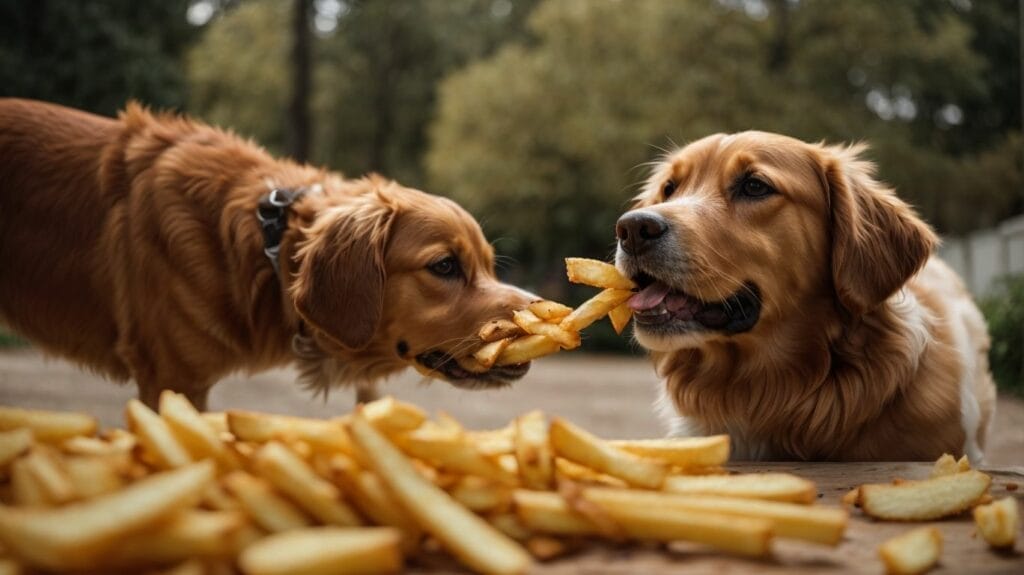Can Dogs Eat Potatoes?
Potatoes are a staple food in many households, but pet owners often wonder if it is safe to share this popular vegetable with their furry companions. Understanding the potential risks and benefits of feeding potatoes to dogs is essential for responsible pet care.
What Are the Different Types of Potatoes?
Before diving into the safety aspect, it’s important to know the different types of potatoes that are commonly available. From russet potatoes to red and sweet potatoes, the nutritional composition of each type may vary.
The Nutritional Value of Potatoes
Potatoes are a rich source of carbohydrates, providing energy for both humans and animals. They also contain essential vitamins and minerals like vitamin C, vitamin B6, potassium, and manganese. However, their nutritional profile can differ depending on factors such as cooking methods and preparation.
Are Potatoes Safe for Dogs?
While potatoes are generally safe for dogs to consume, there are certain considerations to keep in mind. First and foremost, it’s crucial to serve potatoes in moderation and ensure they are prepared in a dog-friendly manner. Individual dogs may have specific dietary requirements or sensitivities that need to be taken into account.
Potential Risks and Side Effects
- Digestive Issues: Dogs may experience digestive upset if they consume excessive amounts of potatoes or if the potatoes are prepared with ingredients that are harmful to dogs.
- Obesity and Weight Gain: Feeding dogs too many potatoes or including them as a regular part of their diet can contribute to weight gain and obesity, especially if other nutritional needs are not met.
- Allergic Reactions: Some dogs may be allergic or sensitive to potatoes, which can manifest as skin irritations, gastrointestinal distress, or other allergic symptoms.
Benefits of Feeding Potatoes to Dogs
- Good Source of Vitamins and Minerals: Potatoes provide essential nutrients like vitamin C and potassium, which can support your dog’s overall health and immune system.
- Dietary Fiber for Digestive Health: The fiber content in potatoes can aid in digestive health and regulate bowel movements in dogs.
Preparing Potatoes for Dogs
To safely feed potatoes to dogs, it’s important to prepare them properly. Avoid using seasonings, oils, salt, or other additives that may be harmful to dogs. Boiled or baked potatoes without any added ingredients are the safest options.
Alternatives to Potatoes for Dogs
If you prefer to opt for alternatives to potatoes, sweet potatoes can be an excellent substitute. They offer similar nutritional benefits and are generally well-tolerated by dogs. Various other dog-friendly vegetables can provide a range of nutrients.
By considering these factors and consulting with your veterinarian, you can make informed decisions about feeding potatoes to your furry friend, ensuring their safety and well-being.
Key takeaways:
- Potatoes can be safe for dogs: While potatoes can be a nutritious addition to a dog’s diet, they should be prepared without any seasonings or added ingredients that might be harmful to dogs.
- Potatoes should be given in moderation: Dogs should consume potatoes in moderation as they are high in carbohydrates, and excessive consumption may lead to weight gain and other health issues.
- Consider alternatives to potatoes: Sweet potatoes can be a healthier alternative to regular potatoes for dogs as they contain more fiber and are generally easier to digest.
Can Dogs Eat Potatoes?
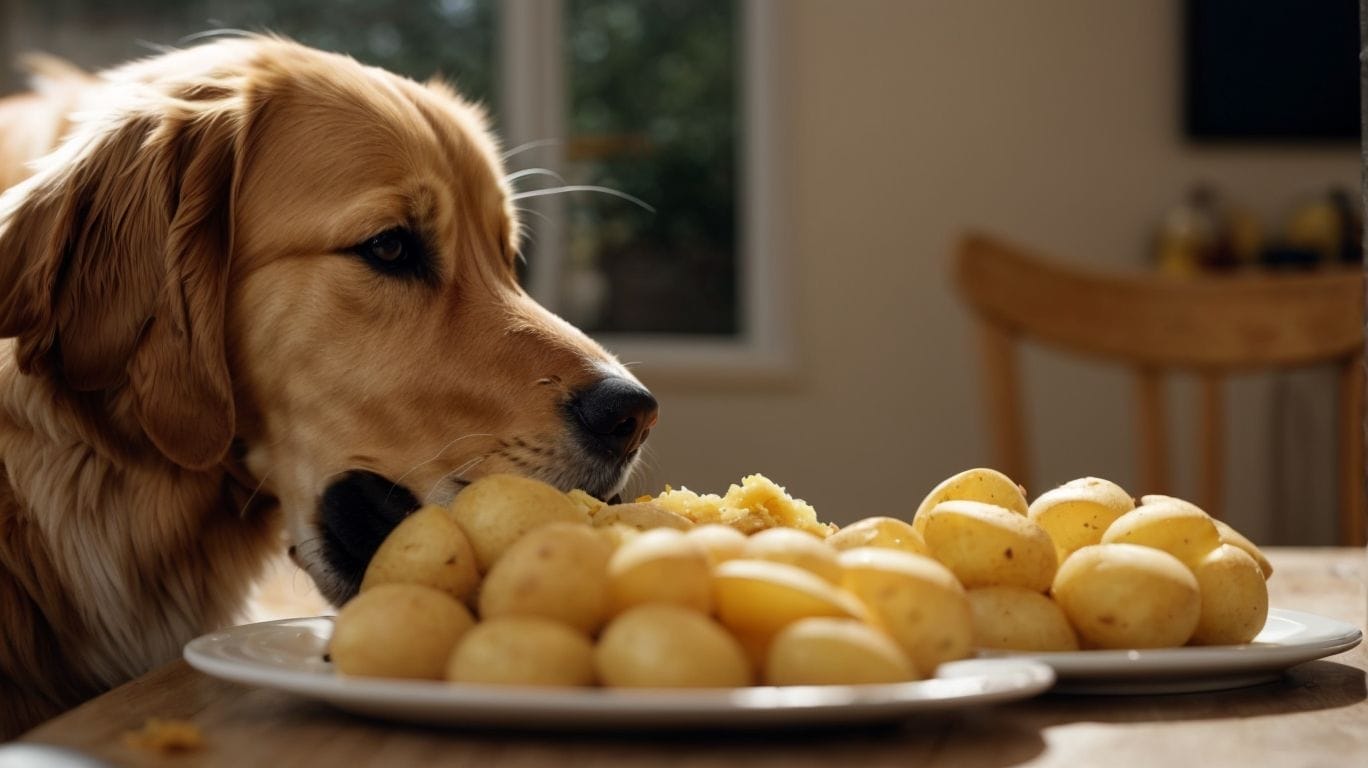
Photo Credits: Petnarnia.Com by Joshua Sanchez
Yes, dogs can eat potatoes, but there are a few factors to consider:
- Cooking method: Boiled or baked potatoes are safe for dogs, but avoid feeding them fried or seasoned potatoes.
- Serving size: Moderation is key; too many potatoes can cause digestive issues or weight gain.
- Preparation: Remove any skin, and never feed raw potatoes or green parts, as they can be toxic.
- Health benefits: Potatoes provide vitamins and minerals, but they should not replace a balanced diet.
Pro-tip: Before introducing potatoes or any new food, consult with your veterinarian to ensure it aligns with your dog’s dietary needs.
Can Dogs Eat Potatoes?
What Are the Different Types of Potatoes?
Potatoes come in a variety of types, each offering its distinct textures, flavors, and cooking properties. Here is a table summarizing some popular potato varieties:
| Type of Potato | Description |
| Russet | Large, starchy potato with a fluffy texture, ideal for baking |
| Yukon Gold | Medium-sized potato with a buttery flavor, great for mashing |
| Red Potatoes | Small, waxy potatoes with a creamy texture, perfect for boiling |
| Fingerling | Small, elongated potatoes with a firm texture, great for roasting |
| Purple Potatoes | Small, vibrant potatoes with a slightly sweet flavor, wonderful for salads |
Each type of potato has its unique characteristics that make it suitable for various recipes and dishes. So, if you’re wondering, “What Are the Different Types of Potatoes?” then look no further. Whether you desire a crispy oven-baked potato or a smooth and creamy mashed potato, there is a potato variety that will meet your needs.
The Nutritional Value of Potatoes
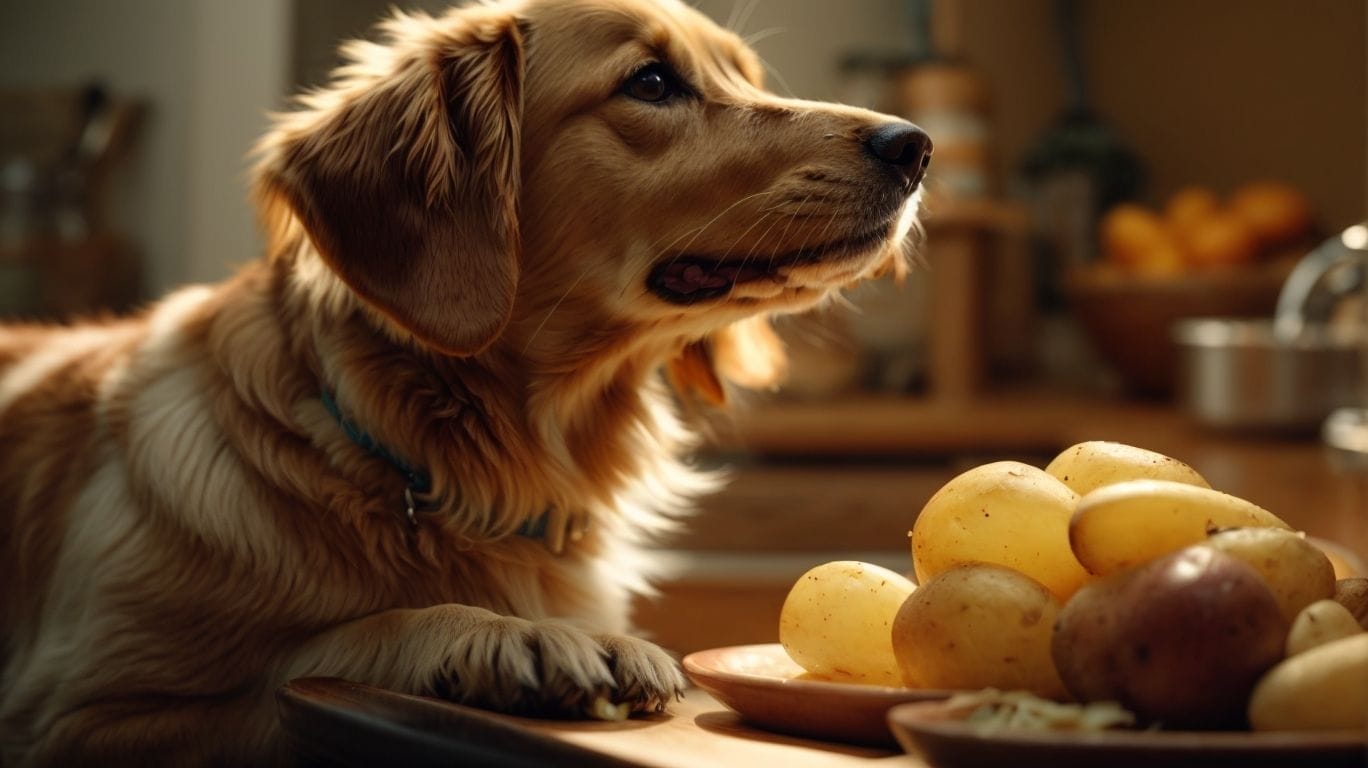
Photo Credits: Petnarnia.Com by Michael Young
Potatoes are a nutrient-rich food that can offer several health benefits. The nutritional value of potatoes is quite impressive. They are a good source of carbohydrates, providing energy for the body. Additionally, potatoes boast important vitamins such as vitamin C and B vitamins, which are essential for overall health. Furthermore, they are packed with dietary fiber, promoting digestive health. Potatoes also contain essential minerals like potassium and magnesium, which are necessary for the proper functioning of the body. Including potatoes in a balanced diet can greatly contribute to a healthy lifestyle.
| Nutrient | Amount per 100g | % Daily Value |
|---|---|---|
| Carbohydrates | 17g | 6% |
| Fiber | 2.2g | 8% |
| Vitamin C | 19.7mg | 22% |
| Potassium | 429mg | 9% |
| Magnesium | 23mg | 6% |
My friend, Sarah, used to avoid eating potatoes, thinking they were unhealthy. After learning about the nutritional value of potatoes, she started incorporating them into her meals. She noticed an increase in her energy levels and overall well-being. Now, Sarah enjoys a variety of potato dishes and encourages others to do the same while keeping a balanced diet.
Are Potatoes Safe for Dogs?
Are Potatoes Safe for Dogs?
Potatoes can be safe for dogs if prepared properly. It’s important to feed potatoes in moderation and consider your dog’s overall diet and health needs. They should be cooked without any seasonings or additives, as these can be harmful. Raw potatoes and green portions of potatoes contain solanine, a toxic compound. However, when cooked thoroughly, potatoes can provide dogs with beneficial nutrients like vitamins and dietary fiber. For dogs with specific dietary concerns or sensitivities, it’s best to consult with a veterinarian before feeding them potatoes. It is a fact that sweet potatoes are a healthier alternative to regular potatoes for dogs due to their higher nutritional value.
Potential Risks and Side Effects
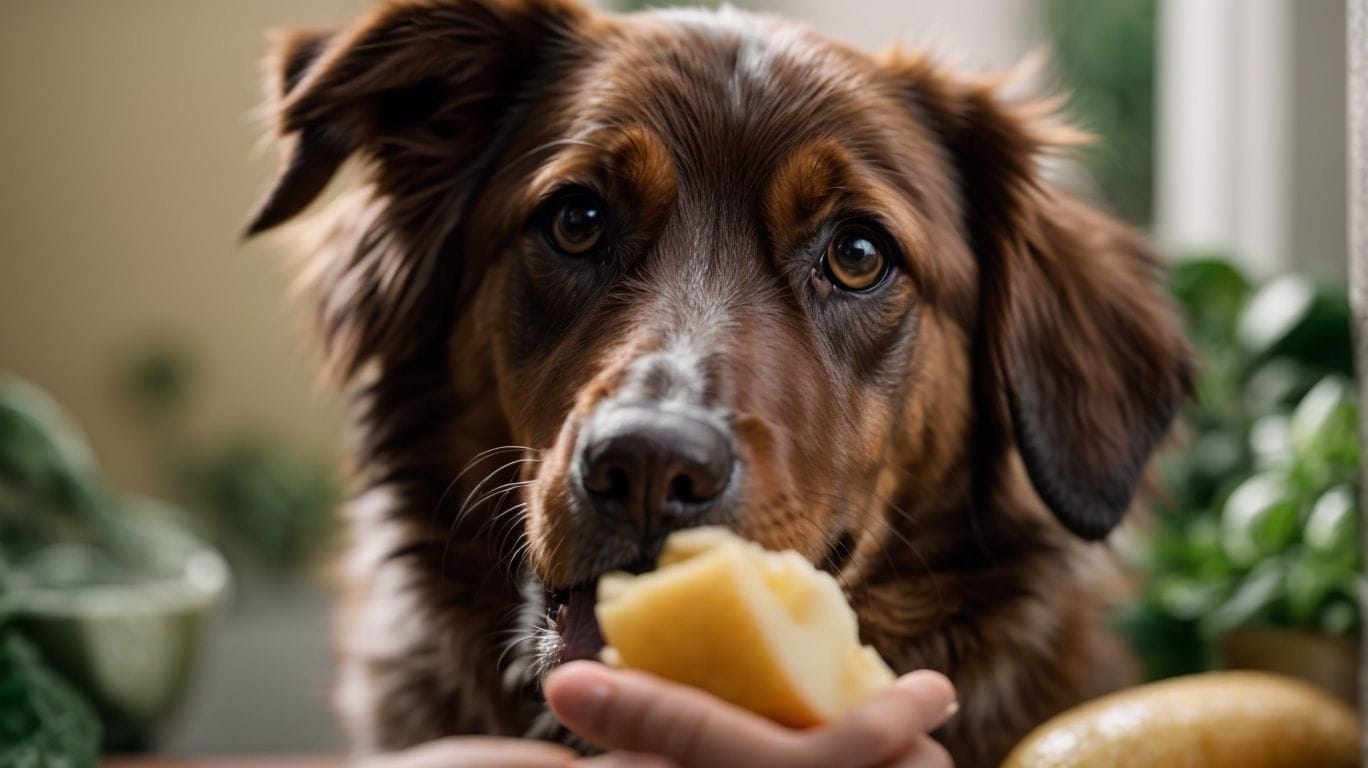
Photo Credits: Petnarnia.Com by Robert Nguyen
Discover the hidden dangers of feeding potatoes to our furry friends. In this eye-opening section, we’ll uncover the potential risks and side effects that can arise when dogs consume this starchy tuber. From digestive issues to the potential for obesity and unexpected allergic reactions, we’ll explore the alarming consequences that every dog owner should be aware of. Brace yourself for some surprising facts and important insights into the effects of potatoes on our beloved canines.
Digestive Issues
Digestive issues can arise when dogs consume potatoes. It is crucial to be aware of the potential risks and take necessary precautions. Here are some points to keep in mind regarding digestive problems in dogs:
- Quantity: Feeding large amounts of potatoes can result in gastrointestinal upset, such as diarrhea and vomiting.
- Preparation: Eliminate any green portions or sprouts from the potatoes as they contain solanine, which is a toxic compound that can cause digestive issues.
- Cooking Method: The best way to minimize digestive problems is by boiling or steaming potatoes without adding fats or seasonings.
- Portion Control: Limit the quantity of potatoes given to your dog to prevent overwhelming their digestive system.
- Monitoring: After feeding potatoes to your dog, carefully observe them for any signs of discomfort or digestive disturbances.
Instead of potatoes, consider alternative options like sweet potatoes or other vegetables that are less likely to cause digestive issues. Remember to always consult with your veterinarian before making any changes to your dog’s diet.
Obesity and Weight Gain
Obesity and weight gain are potential risks associated with feeding dogs potatoes. This is because potatoes are starchy and high in carbohydrates, which can contribute to weight gain if consumed excessively. If dogs consume too many calories from potatoes, especially if they have a sedentary lifestyle, it can lead to obesity. It is crucial to monitor the portion size and overall calorie intake of your dog’s diet to prevent weight gain. To avoid this, it is recommended that they incorporate other low-calorie alternatives such as sweet potatoes or other vegetables into their meals. Additionally, encouraging an active lifestyle and regular exercise can be helpful in maintaining a healthy weight for dogs.
Allergic Reactions
Allergic Reactions can occur in dogs when they consume potatoes. Symptoms associated with these allergic reactions may include itching, redness, swelling, and gastrointestinal issues. It is essential to note that while some dogs may have allergies to potatoes, others may tolerate them well. If you suspect that your dog is experiencing an allergic reaction, it is recommended that you consult with your veterinarian. To prevent allergic reactions, it is advisable to avoid feeding potatoes to your dog or introduce them in small quantities under veterinary supervision. Here’s a pro tip: Always closely monitor your dog after introducing any new food to identify any potential allergies or adverse reactions.
Benefits of Feeding Potatoes to Dogs
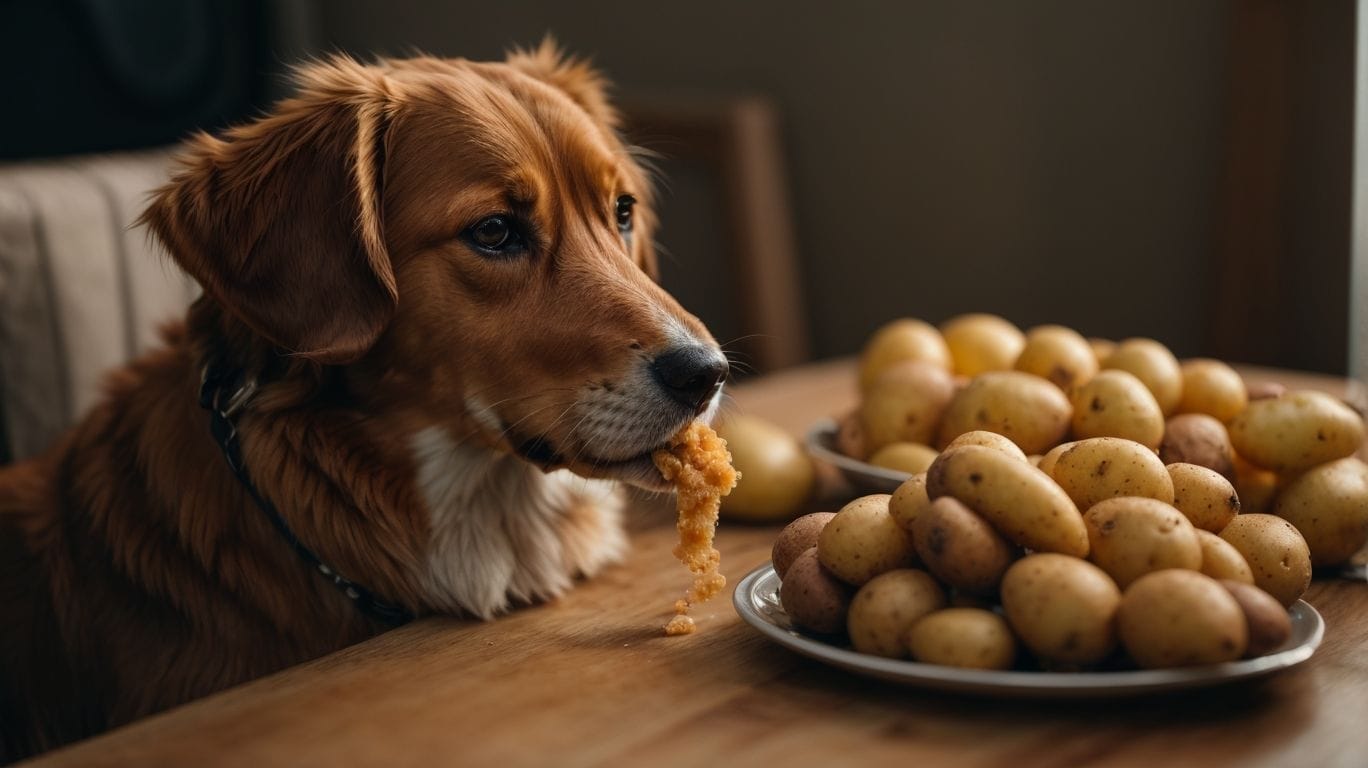
Photo Credits: Petnarnia.Com by Henry Taylor
Discover the incredible benefits of incorporating potatoes into your dog’s diet. From being a good source of essential vitamins and minerals to promoting digestive health with its dietary fiber content, potatoes offer a variety of advantages for your furry friend’s well-being. So, if you’ve ever wondered whether dogs can eat potatoes, get ready to unveil the numerous perks associated with this versatile and nutritious ingredient. Get ready to boost your pup’s health with the power of potatoes!
Good Source of Vitamins and Minerals
Potatoes are a good source of vitamins and minerals for dogs when prepared and served properly. When incorporating potatoes into a dog’s diet, the following benefits can be provided naturally:
- Vitamins: Potatoes are rich in essential vitamins such as vitamin C, vitamin B6, and potassium, which play a vital role in maintaining a dog’s overall health and bolstering their immune system.
- Minerals: Potatoes also contribute to a dog’s bone health and blood production due to their mineral content, including magnesium and iron.
Pro-tip: To ensure the well-being of your dog, thoroughly cook potatoes and eliminate any seasonings, oils, or additives before serving. Remember that moderation is key because excessive consumption can result in weight gain or digestive issues. It is always advisable to consult with your veterinarian before making any dietary changes for your dog’s health and safety.
Dietary Fiber for Digestive Health
Dietary fiber is crucial for maintaining digestive health in dogs, as it provides a range of benefits. Consider the following key points:
- Digestive regularity: Incorporating dietary fiber into a dog’s diet helps regulate bowel movements, preventing both constipation and diarrhea.
- Improved digestion: The presence of fiber aids in breaking down food, thereby promoting better absorption of essential nutrients.
- Weight management: Diets high in fiber help dogs feel fuller for longer periods, reducing the tendency to overeat and supporting weight control.
- Prevention of anal gland issues: Adequate intake of dietary fiber can assist in preventing problems with the anal glands, such as impactions and infections.
Preparing Potatoes for Dogs
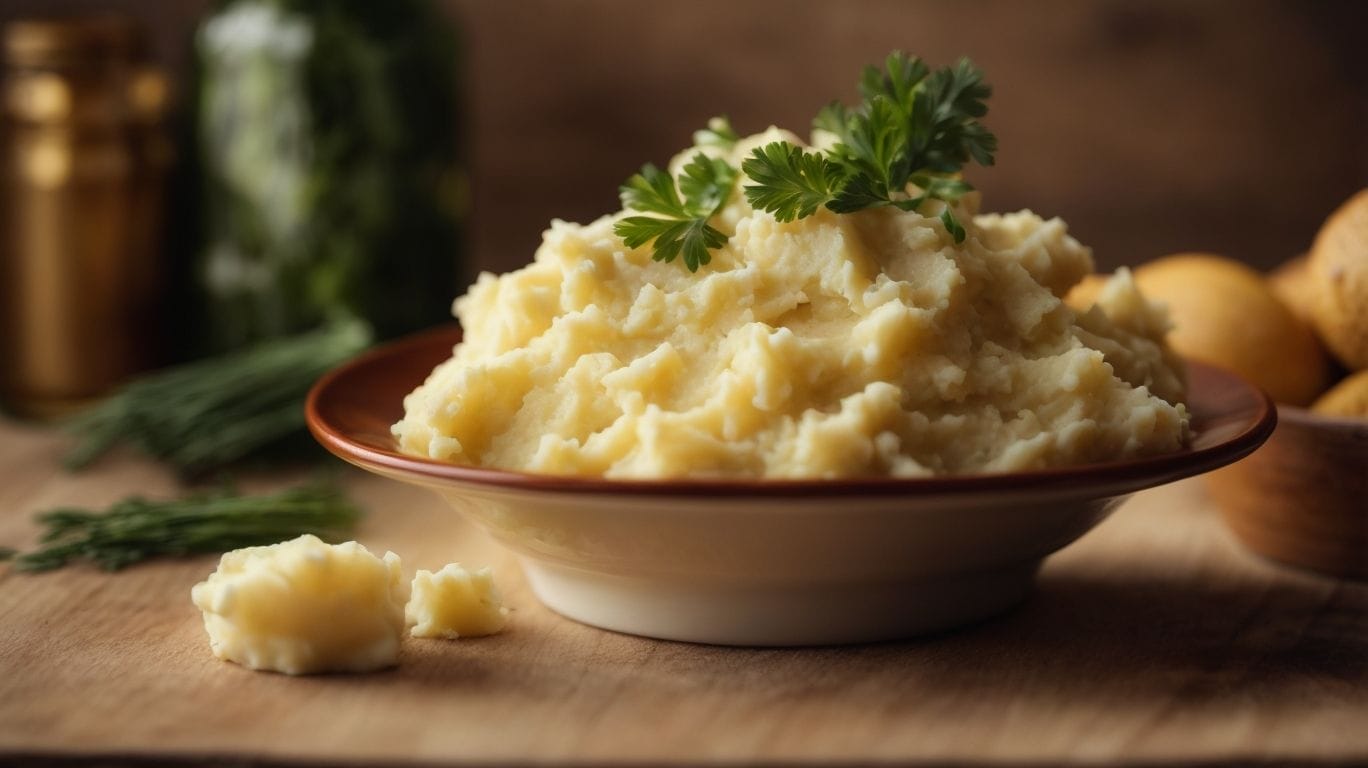
Photo Credits: Petnarnia.Com by Logan Wright
When it comes to preparing potatoes for our furry friends, there are important considerations to keep in mind. In this section, we’ll explore how to feed potatoes to dogs safely safely. With helpful tips and guidelines, we’ll ensure that your canine companion can enjoy this tasty treat without any potential health risks. So, let’s dig deep into the world of potato preparation for dogs and ensure their well-being while indulging their taste buds!
How to Safely Feed Potatoes to Dogs
To safely feed potatoes to your dogs, follow these steps:
- Choose organic potatoes to avoid pesticides.
- Wash the potatoes thoroughly to remove any dirt or contaminants.
- Peel the potatoes to remove the skin, which can be difficult for dogs to digest.
- Cook the potatoes by boiling or baking them until they are soft and fully cooked.
- Mash or dice the potatoes into small, bite-sized pieces for easy consumption.
- Cool the potatoes before serving to prevent burns or discomfort.
- Introduce potatoes gradually, starting with small portions to gauge your dog’s tolerance.
Fact: Potatoes are a good source of vitamins C and B6, potassium, and dietary fiber, but should only be given to dogs in moderation as part of a balanced diet.
Alternatives to Potatoes for Dogs
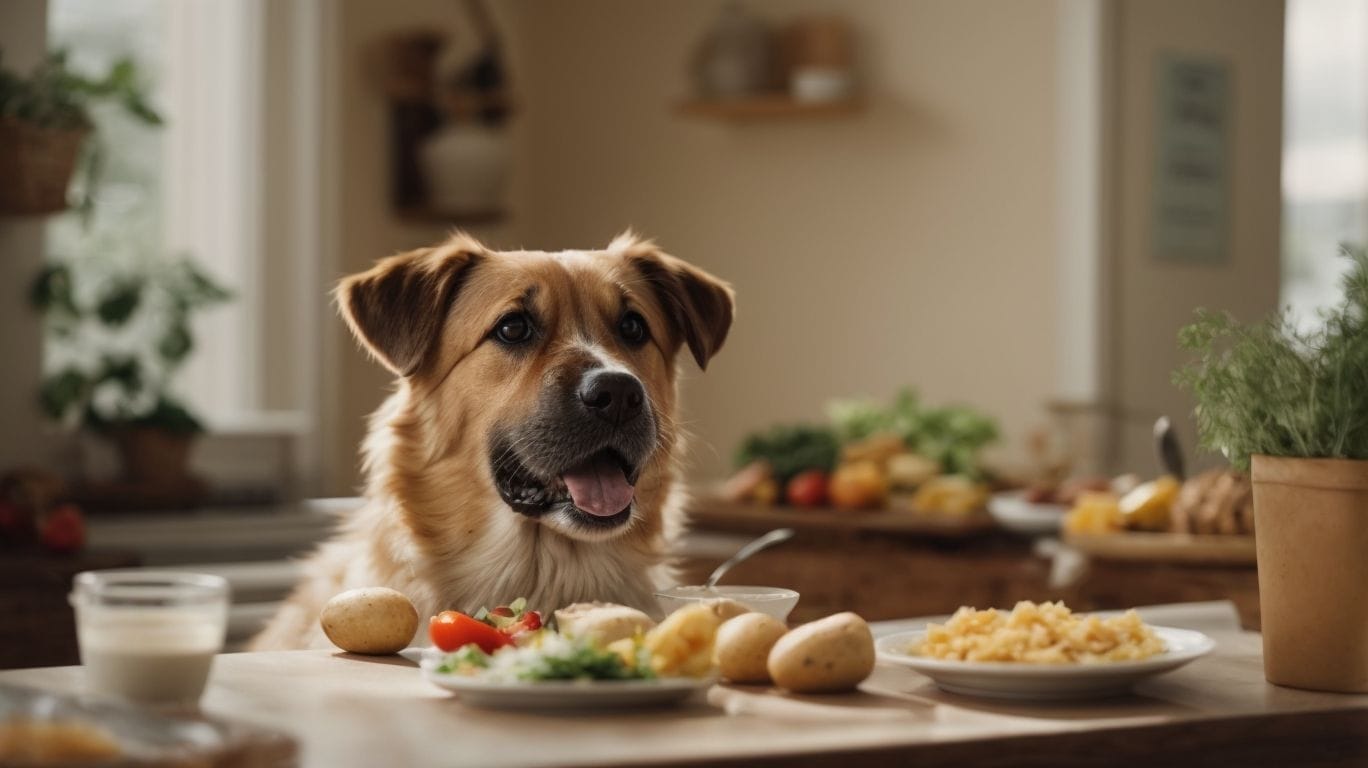
Photo Credits: Petnarnia.Com by Albert Nelson
Are you looking for healthier options for your furry friend instead of potatoes? Well, we’ve got you covered! In this section, we’ll dig into some delicious alternatives that dogs can devour without any worries. From the nutritious sweetness of sweet potatoes to a variety of other dog-friendly vegetables, you’ll discover a whole new world of ingredients that will have your pup begging for more. So, let’s explore these delectable options and give your canine companion a treat they’ll truly enjoy!
Sweet Potatoes
Sweet Potatoes are a highly nutritious and safe option for dogs. They are packed with an abundance of vitamins, minerals, and dietary fiber, making them an incredibly healthy addition to your furry friend’s diet. The fantastic thing about Sweet Potatoes is that they not only provide essential nutrients but also promote good digestive health. To prepare them, you can either bake, boil, or steam them. Before feeding Sweet Potatoes to your dog, remember to discard the skin and cut them into small, bite-sized pieces. While Sweet Potatoes are undeniably a great choice, it’s always wise to consult your veterinarian before introducing any new food into your dog’s diet.
Other Vegetables
Evaluating other vegetables as alternatives for dogs can provide varied nutrients and minimize the risks associated with feeding potatoes. Here is a comparison table showcasing the nutritional benefits of different vegetables for dogs:
| Vegetable | Vitamins | Minerals | Fiber |
|---|---|---|---|
| Carrots | A, K | Potassium, Magnesium | Yes |
| Iron, Calcium | |||
| Green Beans | C, K | Iron, Calcium | Yes |
| Pumpkin | A, C, E | Iron, Potassium, Magnesium | Yes |
| Broccoli | A, C, K | Calcium, Potassium, Phosphorus | Yes |
Considering these options, dogs can safely enjoy a variety of other vegetables as part of their balanced diet. It’s always recommended to consult with a veterinarian to ensure optimal nutrition and dietary needs for your furry friend.
Some Facts About Can Dogs Eat Potatoes?
- ✅ Dogs can eat potatoes, but they should be cooked thoroughly and not contain any seasonings. (Source: Our Team)
- ✅ Raw potatoes should never be given to dogs as they contain solanine, which can be harmful. (Source: Our Team)
- ✅ Dogs with diabetes should avoid potatoes as they can increase blood sugar levels. (Source: Our Team)
- ✅ Potato skins should only be given to dogs sparingly as they contain oxalates, which can cause kidney problems in large amounts. (Source: Our Team)
- ✅ Mashed potatoes for dogs should be plain and unseasoned, without salt, garlic, onion powder, or other seasonings. (Source: Our Team)
